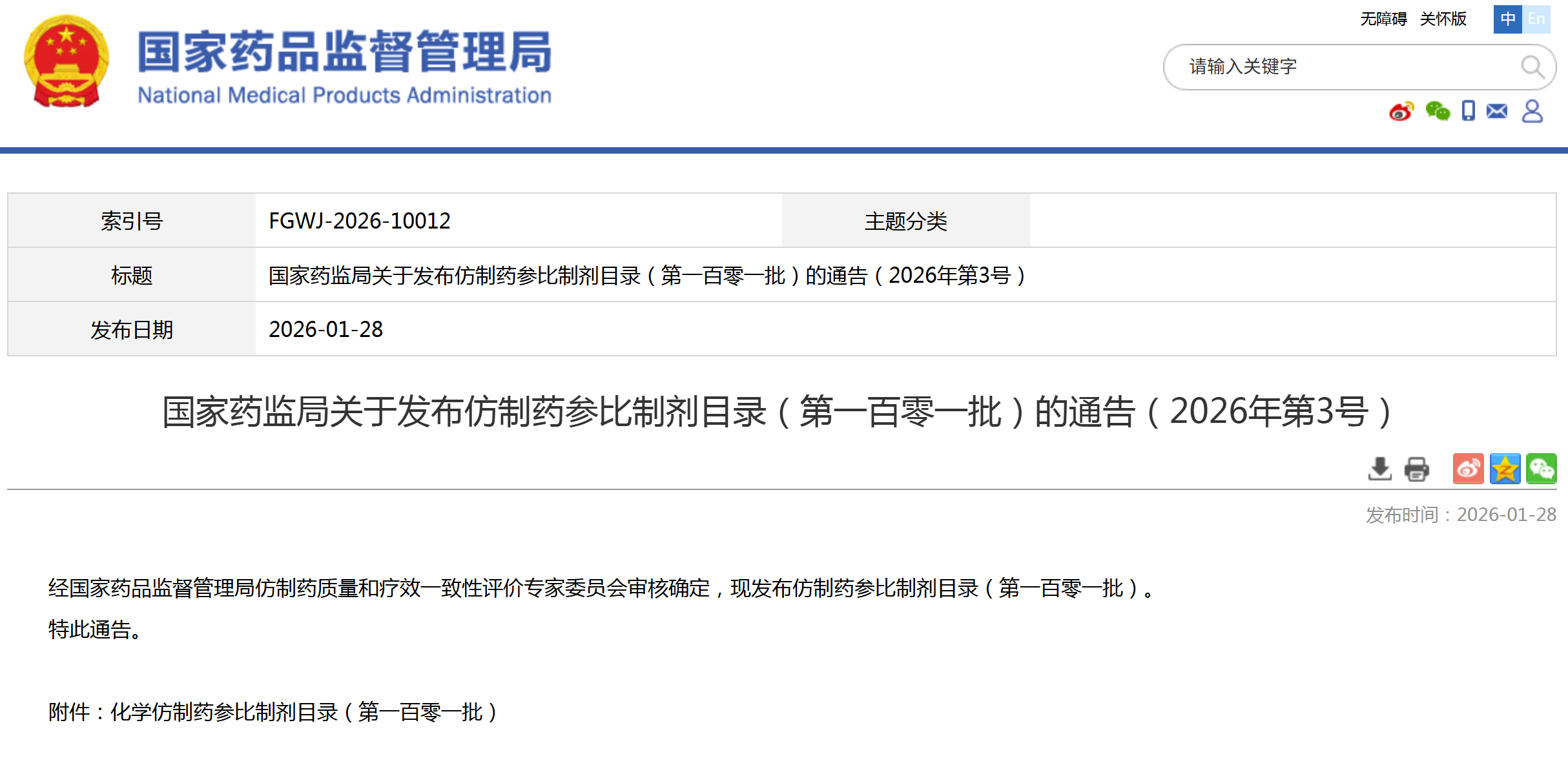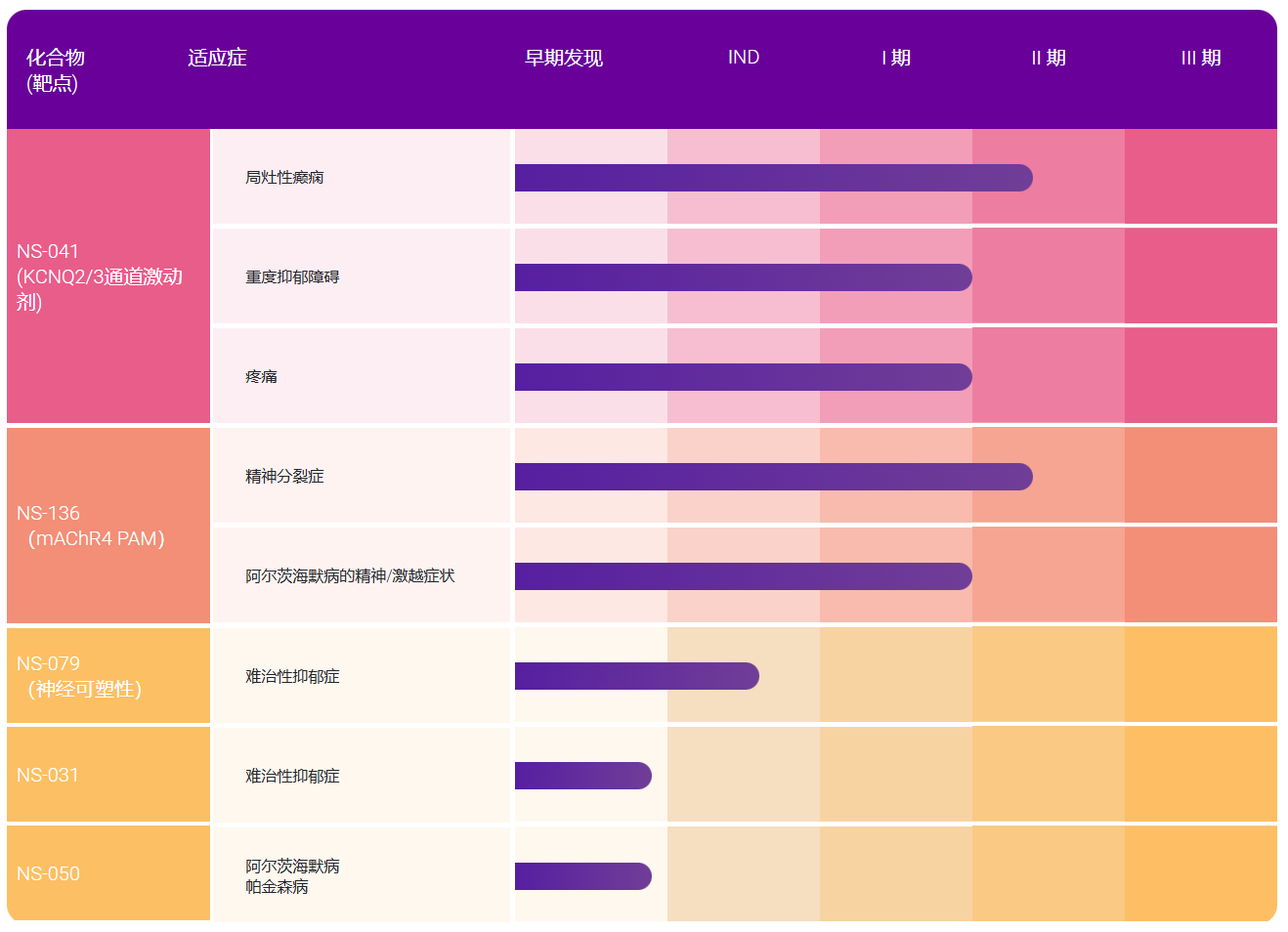诺华(Novartis)4月29日宣布,抗癌药Zykadia(ceritinib)获FDA批准,用于经Xalkori(crizotinib)治疗后病情恶化或对Xalkori不耐受的间变性淋巴瘤激酶阳性(ALK+)转移性非小细胞肺癌(NSCLC)患者的治疗。此前,FDA已授予Zykadia突破性疗法认定。
对于启动Xalkori初步治疗后病情复发的ALK+NSCLC患者群体,Zykadia将是一个重要的治疗选择,将解决这一群体中未获满足的医疗需求。
Zykadi的获批,是基于一项关键临床试验的数据。该试验在163例经Xalkori治疗后病情恶化或对Xalkori不耐受的ALK+NSCLC患者中开展。该研究群体中,肿瘤转移的最常见部位为脑(60%)、肝脏(42%)、骨骼(42%)。研究数据表明,Zykadia治疗取得了54.6%的总响应率(ORR),平均响应持续时间为7.4个月。
肺癌是导致癌症死亡的主要原因之一。非小细胞肺癌(NSCLC)占到了肺癌病例的85%-90%,其中2%-7%病例由ALK基因的重排(rearrangement)所驱动,导致癌细胞的加速生长。尽管ALK+NSCLC群体的临床治疗已取得显着进展,但病情恶化往往是不可避免的,因此需要更多的治疗选择。
关于Zykadia(ceritinib):
Zykadia是一种口服、选择性间变性淋巴瘤激酶(ALK)抑制剂。在肺癌的临床治疗中,ALK是一个重要的治疗靶标。ALK基因能够与其他基因融合,表达一种异常的融合蛋白,促进癌细胞的形成和生长。FDA于2013年3月授予Zykadia突破性疗法认定。
关于Xalkori(crizotinib):
Xalkori是一种变性淋巴瘤激酶(ALK)抑制剂,于2011年获FDA加速批准,并于2013年获FDA正式批准,用于经FDA批准的一款检测试剂盒证实其肿瘤为间变性淋巴瘤激酶(ALK)阳性的转移性非小细胞肺癌(NSCLC)患者的治疗。
Xalkori是首个对间变性淋巴瘤激酶(ALK)进行靶向治疗的药物。目前,该药已获全球60多个国家批准,包括美国、欧盟、加拿大、中国、韩国、日本、澳大利亚。Xalkori的上市,已极大地改变了晚期ALK+NSCLC患者的临床治疗。(生物谷Bioon.com)
英文原文:Novartis gains FDA approval for Zykadia(TM), first therapy for patients with ALK+ NSCLC previously treated with the ALK inhibitor crizotinib
-Zykadia (ceritinib) demonstrated an overall response rate of 54.6% in patients with ALK+ metastatic NSCLC who have no other treatment option[1]
-Median duration of response to Zykadia was 7.4 months; patients in study started treatment with metastases, including brain (60%), liver (42%) and bone (42%)[1]
-ALK+ NSCLC is driven by a rearrangement of the ALK gene, which is responsible for cancer cell growth in 2-7% of patients with NSCLC[2]
-Approval follows FDA Breakthrough Therapy designation; regulatory application submitted in the EU and filings underway with other health authorities worldwide
Basel, April 29, 2014 - Novartis announced today that the US Food and Drug Administration (FDA) has approved Zykadia(TM) (ceritinib, previously known as LDK378) for the treatment of patients with anaplastic lymphoma kinase-positive (ALK+) metastatic non-small cell lung cancer (NSCLC) who have progressed on or are intolerant to crizotinib[1]. The approval of Zykadia addresses an unmet medical need for patients with this type of lung cancer who have progressed on prior therapy.
“Zykadia represents an important treatment option for ALK+ NSCLC patients who relapse after starting initial therapy with crizotinib,” said lead investigator Alice T. Shaw, MD, PhD, Massachusetts General Hospital Cancer Center, Boston. “This approval will affect the way we manage and monitor patients with this type of lung cancer, as we will now be able to offer them the opportunity for continued treatment response with a new ALK inhibitor.”
Lung cancer is the leading cause of cancer death worldwide. The most common type of lung cancer is NSCLC, accounting for 85-90% of all cases[3]. Of those, 2-7% are driven by a rearrangement of the ALK gene, which increases the growth of cancer cells and can be identified by a molecular test of the cancer tumor[2]. Despite significant treatment advances for patients with ALK+ NSCLC, disease progression is often inevitable and more options are needed.
The approval of Zykadia is based on a pivotal trial that included 163 patients with metastatic ALK+ NSCLC who progressed on or were intolerant to treatment with crizotinib. The most common sites of metastases in the patient population studied were brain (60%), liver (42%) and bone (42%)[1].
Among previously-treated patients, Zykadia achieved an overall response rate (ORR) of 54.6% [95% CI, 47-62%] and a median duration of response (DOR) of 7.4 months [95% CI, 5.4-10.1 months][1]. The most common adverse reactions (incidence of at least 25%) were diarrhea, nausea, elevated transaminases, vomiting, abdominal pain, fatigue, decreased appetite and constipation[1].
“The approval of Zykadia less than three and a half years after the first patient entered our clinical trial exemplifies what is possible with a highly focused approach to drug development and strong collaboration,” said Alessandro Riva, MD, President, Novartis Oncology ad interim and Global Head, Oncology Development and Medical Affairs. “The dedication of clinical investigators, patients, the FDA and others has enabled us to bring this medicine to patients in need as swiftly as possible.”
Zykadia is an oral, selective inhibitor of ALK, an important therapeutic target in lung cancer. ALK is a gene that can fuse with other genes to form an aberrant “fusion protein” that promotes the development and growth of cancer cells[4],[5]. Zykadia is one of the first medicines to be approved following FDA Breakthrough Therapy designation, which was received in March 2013 due to the significance of results observed in the pivotal trial and the serious and life-threatening nature of ALK+ NSCLC. Additional regulatory submissions for Zykadia are underway worldwide, with an application currently filed in the European Union.
About the pivotal trial and Zykadia clinical trial program
The efficacy of Zykadia was established in a multicenter, single-arm, open-label clinical trial. A total of 163 patients with metastatic ALK+ NSCLC who progressed on or were intolerant to treatment with crizotinib were enrolled and treated at a Zykadia dose of 750 mg once daily. The major efficacy outcome measure was ORR according to RECIST v1.0 as evaluated by both investigators and a Blinded Independent Central Review Committee (BIRC)。 DOR was an additional outcome measure[1].
The study population characteristics were: median age 52 years, age less than 65 (87%), female (54%), Caucasian (66%), Asian (29%), never or former smoker (97%), ECOG PS 0 or 1 (87%), progression on previous crizotinib (91%), number of prior therapies 2 or more (84%), and adenocarcinoma histology (93%)。 Sites of extra-thoracic metastasis included brain (60%), liver (42%) and bone (42%)。 ALK-positivity was verified retrospectively by review of local test results for 99% of patients[1].
Zykadia achieved an ORR of 54.6% [95% CI, 47-62%] and a median DOR of 7.4 months [95% CI, 5.4-10.1 months] based on investigator assessment. The analysis by the BIRC assessment was similar to the analysis by the investigator assessment with an ORR of 43.6% [95% CI, 36-52%] and a median DOR of 7.1 months [95% CI, 5.6-NE months][1].
This study is part of the ongoing Novartis clinical trial program in this patient population. Several major studies evaluating treatment with ceritinib are being conducted in more than 300 study centers across more than 30 countries. Two Phase II single-arm clinical trials in previously-treated and treatment-na?ve ALK+ NSCLC patients, (www.clinicaltrials.gov identifiers NCT01685060 and NCT01685138), are fully enrolled and ongoing. In addition, two Phase III clinical trials comparing ceritinib with chemotherapy in treatment-na?ve and in previously-treated patients, (www.clinicaltrials.gov identifiers NCT01828099 and NCT01828112), are ongoing and actively recruiting patients worldwide[6],[7],[8],[9].
About Zykadia
Zykadia (ceritinib) is indicated for the treatment of patients with ALK+ metastatic NSCLC who have progressed on or are intolerant to crizotinib. This indication is approved under accelerated approval based on tumor response rate and duration of response. An improvement in survival or disease-related symptoms has not been established. Continued approval for this indication may be contingent upon verification and description of clinical benefit in confirmatory trials.
Zykadia Important Safety Information
Diarrhea, nausea, vomiting, or abdominal pain occurred in 96% of 255 patients including severe cases in 14% of patients treated with Zykadia in Study 1. Dose modification due to diarrhea, nausea, vomiting, or abdominal pain occurred in 38% of patients. Patients should be monitored and managed using standards of care, including anti-diarrheals, anti-emetics, or fluid replacement, as indicated. Based on the severity of the adverse drug reaction, withhold Zykadia with resumption at a reduced dose as described in Table 1 of the package insert.
Drug-induced hepatotoxicity occurred in patients treated with Zykadia. Elevations in alanine aminotransferase (ALT) greater than 5 times the upper limit of normal (ULN) occurred in 27% of 255 patients in Study 1. One patient (0.4%) required permanent discontinuation due to elevated transaminases and jaundice. Patients should be monitored with liver laboratory tests including ALT, aspartate aminotransferase (AST), and total bilirubin once a month and as clinically indicated, with more frequent testing in patients who develop transaminase elevations. Based on the severity of the adverse drug reaction, withhold Zykadia with resumption at a reduced dose, or permanently discontinue Zykadia as described in Table 1 of the package insert.
Severe, life-threatening, or fatal interstitial lung disease (ILD)/pneumonitis can occur in patients treated with Zykadia. In Study 1, pneumonitis was reported in 4% of 255 patients treated with Zykadia. CTCAE Grade 3 or 4 ILD/pneumonitis was reported in 3% of patients, and fatal ILD/pneumonitis was reported in 1 patient (0.4%) in Study 1. One percent (1%) of patients discontinued Zykadia in Study 1 due to ILD/pneumonitis. Patients should be monitored for pulmonary symptoms indicative of ILD/pneumonitis. Exclude other potential causes of ILD/pneumonitis, and permanently discontinue Zykadia in patients diagnosed with treatment-related ILD/pneumonitis.
QTc interval prolongation occurs in patients treated with Zykadia. Three percent (3%) of 255 patients experienced a QTc interval increase over baseline greater than 60 msec in Study 1. Across the development program of Zykadia, one of 304 patients (less than 1%) treated with Zykadia doses ranging from 50 to 750 mg was found to have a QTc greater than 500 msec and 3% of patients had an increase from baseline QTc greater than 60 msec. A pharmacokinetic analysis suggested that Zykadia causes concentration-dependent increases in the QTc interval. When possible, avoid use of Zykadia in patients with congenital long QT syndrome. Conduct periodic monitoring with electrocardiograms (ECGs) and electrolytes in patients with congestive heart failure, bradyarrhythmias, electrolyte abnormalities, or those who are taking medications that are known to prolong the QTc interval. Withhold Zykadia in patients who develop a QTc interval greater than 500 msec on at least 2 separate ECGs until the QTc interval is less than 481 msec or recovery to baseline if the QTc interval is greater than or equal to 481 msec, then resume Zykadia at a reduced dose as described in Table 1 of the package insert. Permanently discontinue Zykadia in patients who develop QTc interval prolongation in combination with Torsade de pointes or polymorphic ventricular tachycardia or signs/symptoms of serious arrhythmia.
Hyperglycemia can occur in patients receiving Zykadia. In Study 1, CTCAE Grade 3-4 hyperglycemia, based on laboratory values, occurred in 13% of 255 patients. There was a 6-fold increase in the risk of CTCAE Grade 3-4 hyperglycemia in patients with diabetes or glucose intolerance and a 2-fold increase in patients taking corticosteroids. Monitor serum glucose levels as clinically indicated. Initiate or optimize anti-hyperglycemic medications as indicated. Based on the severity of the adverse drug reaction, withhold Zykadia until hyperglycemia is adequately controlled, then resume Zykadia at a reduced dose as described in Table 1 of the package insert. If adequate hyperglycemic control cannot be achieved with optimal medical management, permanently discontinue Zykadia.
Bradycardia can occur in patients receiving Zykadia. In Study 1, sinus bradycardia, defined as a heart rate of less than 50 beats per minute, was noted as a new finding in 1% of 255 patients. Bradycardia was reported as an adverse drug reaction in 3% of patients in Study 1. Avoid using Zykadia in combination with other agents known to cause bradycardia (e.g., beta-blockers, non-dihydropyridine calcium channel blockers, clonidine, and digoxin) to the extent possible. Monitor heart rate and blood pressure regularly. In cases of symptomatic bradycardia that is not life-threatening, withhold Zykadia until recovery to asymptomatic bradycardia or to a heart rate of 60 bpm or above, evaluate the use of concomitant medications, and adjust the dose of Zykadia. Permanently discontinue Zykadia for life-threatening bradycardia if no contributing concomitant medication is identified; however, if associated with a concomitant medication known to cause bradycardia or hypotension, withhold Zykadia until recovery to asymptomatic bradycardia or to a heart rate of 60 bpm or above, and if the concomitant medication can be adjusted or discontinued, resume Zykadia at a reduced dose as described in Table 1 of the package insert upon recovery to asymptomatic bradycardia or to a heart rate of 60 bpm or above, with frequent monitoring.
Based on its mechanism of action, Zykadia may cause fetal harm when administered to a pregnant woman. In animal studies, administration of ceritinib to rats and rabbits during organogenesis at maternal plasma exposures below the recommended human dose of 750 mg daily caused increases in skeletal anomalies in rats and rabbits. Apprise women of reproductive potential of the potential hazard to a fetus. Advise females of reproductive potential to use effective contraception during treatment with Zykadia and for at least 2 weeks following completion of therapy.
The most common adverse reactions (incidence of at least 25%) are diarrhea (86%), nausea (80%), vomiting (60%), abdominal pain (54%), fatigue (52%), decreased appetite (34%), and constipation (29%)。 Key laboratory abnormalities (incidence of at least 25%) were decreased hemoglobin (84%), increased alanine transaminase (80%), increased aspartate transaminase (75%), increased creatinine (58%), increased glucose (49%), decreased phosphate (36%), and increased lipase (28%)。
Avoid concurrent use of Zykadia with strong CYP3A inhibitors and strong CYP3A inducers. If concurrent use of a strong CYP3A inhibitor is unavoidable, reduce the dose of Zykadia by approximately one-third. Avoid concurrent use of Zykadia with CYP3A and CYP2C9 substrates with narrow therapeutic indices. Patients should not consume grapefruit and grapefruit juice during treatment with Zykadia. Patients should be instructed to take Zykadia on an empty stomach (i.e., do not take within 2 hours of a meal)。
Please see full Prescribing Information for Zykadia.
Outside of the US, Zykadia (LDK378) is an investigational agent and has not been approved by regulatory authorities.
来源:生物谷
为你推荐
 资讯
资讯 AI制药独角兽深度智耀完成6000万美元新一轮融资,加速全栈式研发解决方案落地
本轮融资吸引了信宸资本、金镒资本、凯泰资本等新投资方入局,老股东鼎晖百孚、新鼎资本持续追加投资
2026-02-03 20:03
 资讯
资讯 济川药业联合康方生物,共拓心血管创新药商业化新局
伊喜宁®(伊努西单抗注射液)是康方生物自主开发创新的PCSK9单克隆抗体新药,于2024年9月获批上市,用于治疗原发性高胆固醇血症和混合型高脂血症,包括杂合子家族性高胆固醇血...
2026-02-03 19:34
拜耳诺倍戈®第三项适应症在中国获批,用于治疗转移性激素敏感性前列腺癌(mHSPC)
诺倍戈®此前已先后获批用于治疗有高危转移风险的非转移性去势抵抗性前列腺癌(NM-CRPC)成年患者,和联合多西他赛治疗转移性激素敏感性前列腺癌的(mHSPC)成年患者。
2026-02-03 18:42
 资讯
资讯 又一款老花眼滴眼液获批,市场有待检验
近日,Tenpoint Therapeutics宣布,美国FDA已批准Yuvezzi(carbachol和brimonidine tartrate滴眼液,2 75% 0 1%),用于治疗成人老花眼。
2026-02-02 14:06
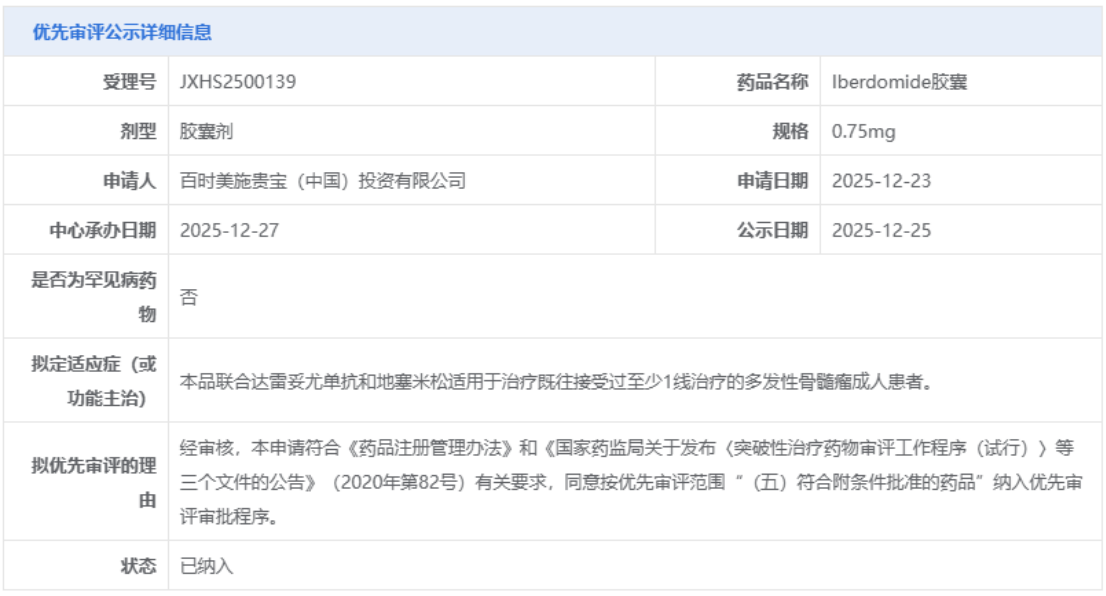 资讯
资讯 深度缓解数据惊艳:基于诺奖机制的 CELMoD药物如何重塑 MM 治疗逻辑?
近期,国家药品监督管理局药品审评中心(CDE)将CELMoD药物 iberdomide (以下简称:IBER)纳入优先审评名单并启动优先审评程序,拟批准
2026-02-02 13:22
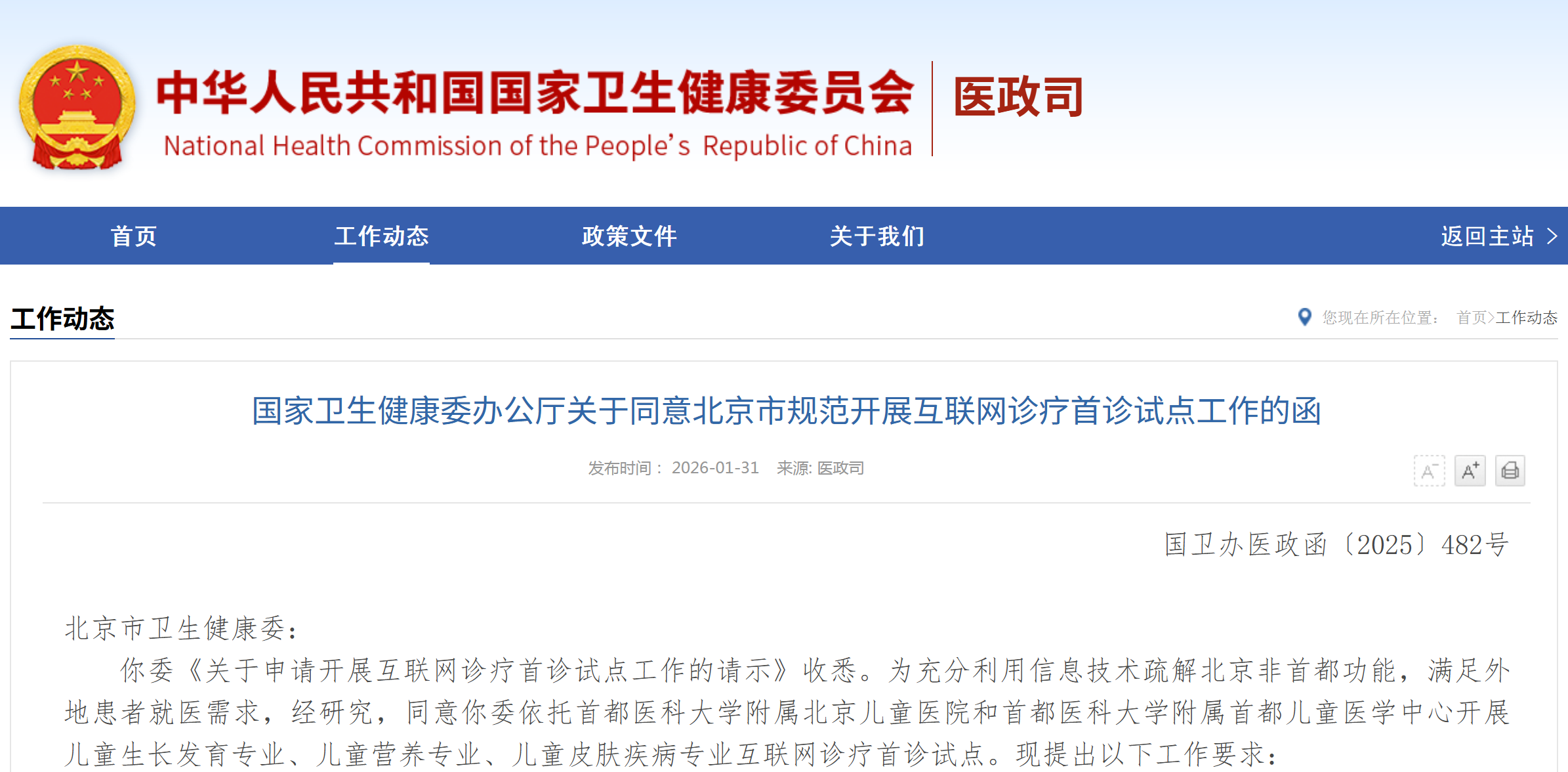 资讯
资讯 儿童生长发育专业、儿童营养专业、儿童皮肤疾病专业纳入北京互联网诊疗首诊试点
经研究,同意你委依托首都医科大学附属北京儿童医院和首都医科大学附属首都儿童医学中心开展儿童生长发育专业、儿童营养专业、儿童皮肤疾病专业互联网诊疗首诊试点。
2026-01-31 23:34
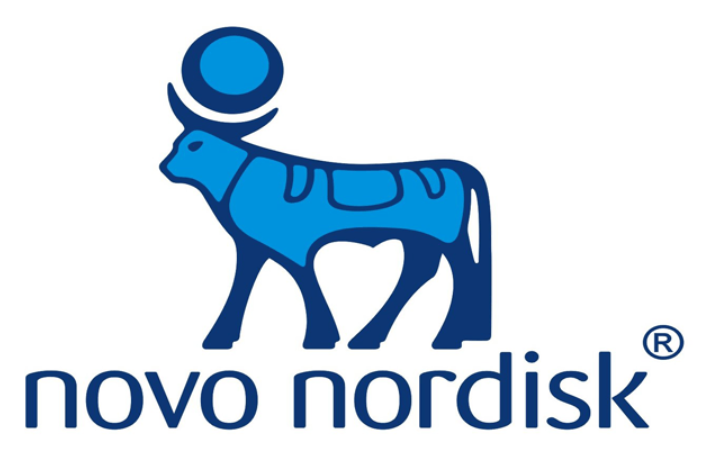 资讯
资讯 诺和诺德大中国区换帅:周霞萍3月底离任,“老兵”蔡琰接棒
1月30日,全球制药巨头诺和诺德正式对外宣布重大人事变动,其全球高级副总裁兼大中国区总裁周霞萍决定离开公司,最后工作日为2026年3月31日
2026-01-31 17:36
 资讯
资讯 思璞锐SciBrunch完成超3500万美元Pre-A轮融资,一年内两轮合计募资6500万美元
本次Pre-A轮融资由生物医药领域知名投资机构弘晖基金(HLC)领投,InnoPinnacle Fund跟投,同时获得老股东汉康资本、博远资本、LongRiver江远投资及骊宸投资的持续加码支持。
2026-01-31 17:30
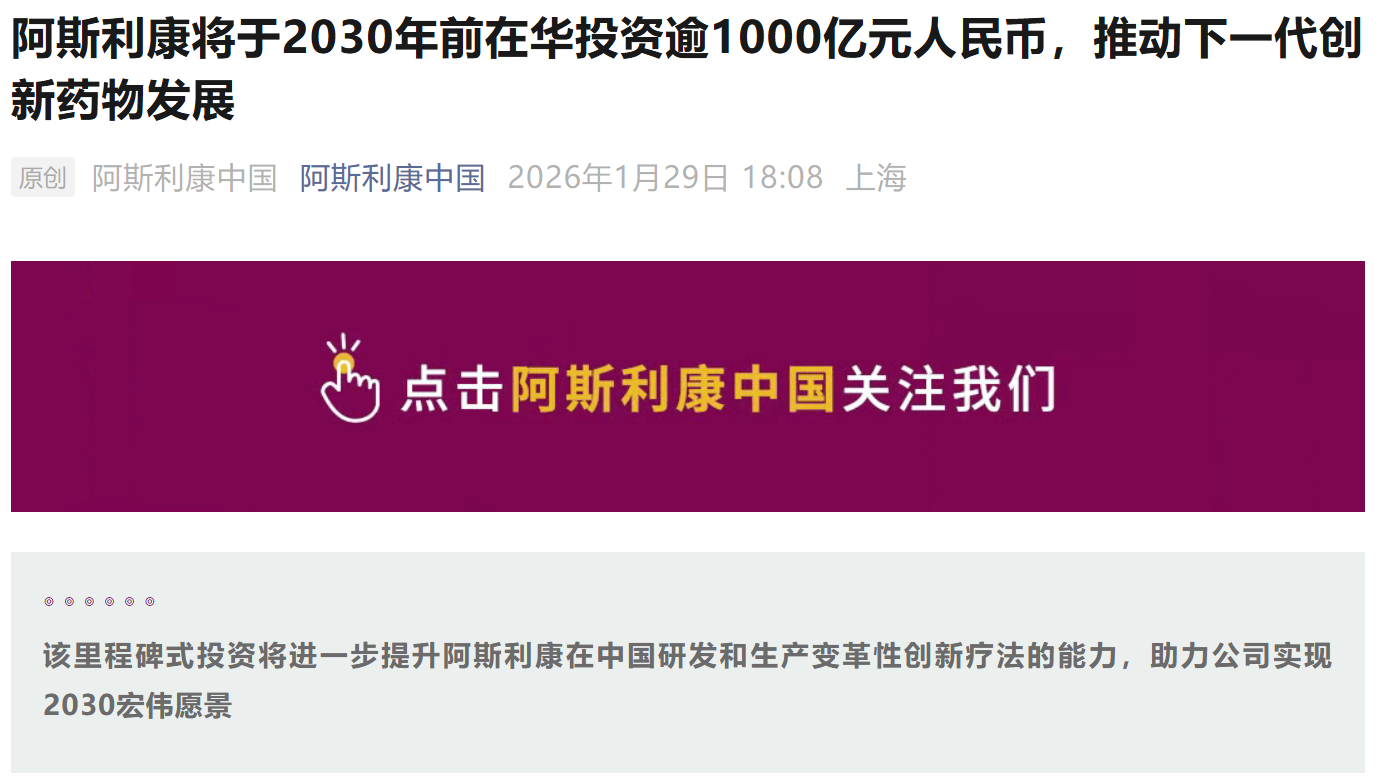 资讯
资讯 阿斯利康宣布将于2030年前在华投资逾1000亿元人民币,与石药集团达成超百亿美元战略合作
1月29日,阿斯利康宣布,计划于2030年前在中国投资逾1000亿元人民币(150亿美元),以扩大在药品生产与研发领域的布局。公司将充分发挥中国的科研优势和先进制造能力,并依托中...
2026-01-30 13:00
 资讯
资讯 从“无差别轰炸”到“定点爆破”,我国二线HER2阳性胃癌治疗迎来靶向ADC新突破
近日,优赫得®(注射用德曲妥珠单抗)正式获得中国国家药品监督管理局(NMPA)批准,单药用于治疗既往接受过一种含曲妥珠单抗治疗方案的局部晚期或转移性HER2阳性成人胃或胃食...
2026-01-29 18:54
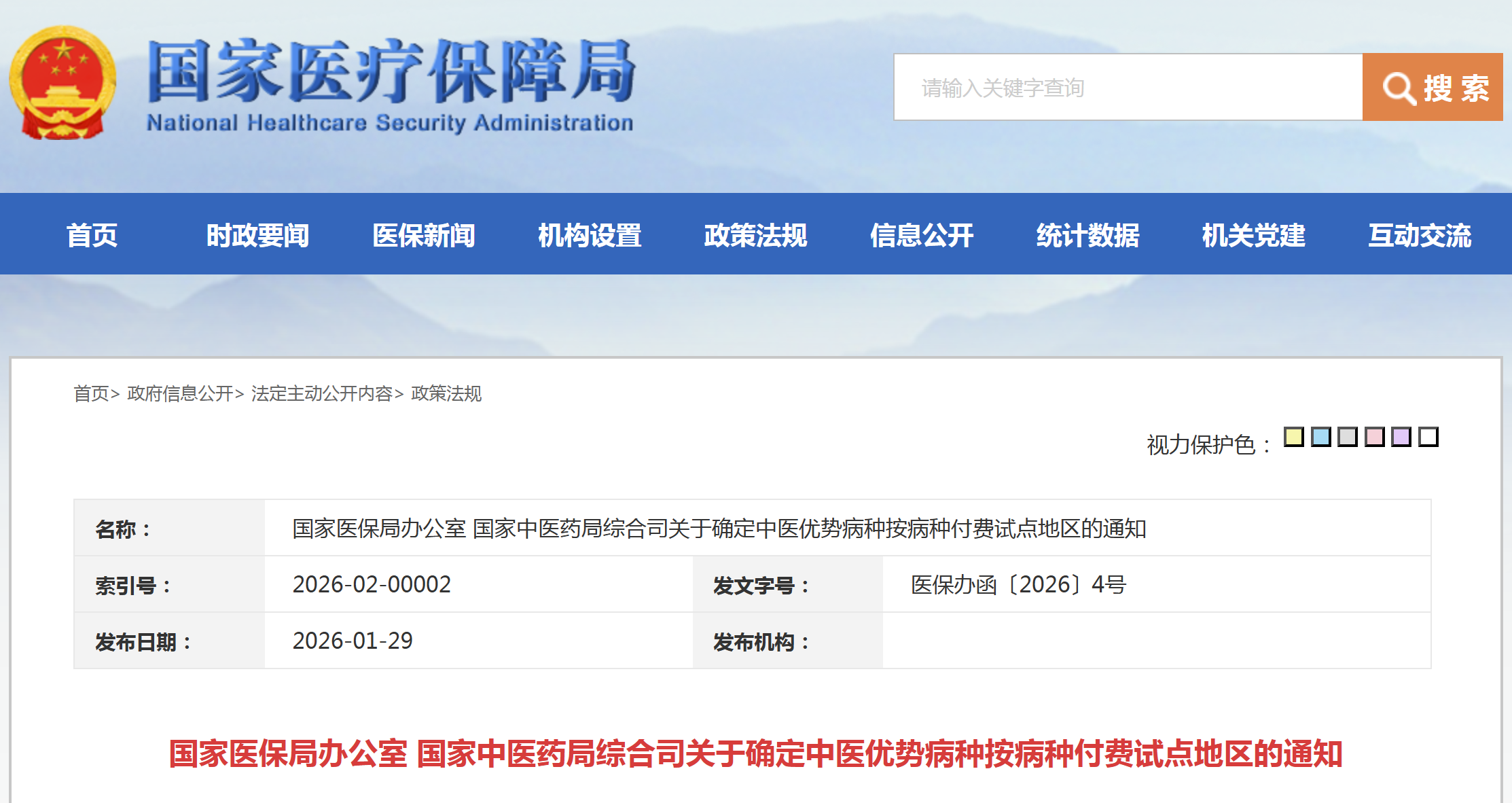 资讯
资讯 18个区域,中医优势病种按病种付费试点地区明确
根据《关于开展中医优势病种按病种付费试点工作的通知》要求,国家医保局、国家中医药局组织专家对申报中医优势病种按病种付费试点的地区开展遴选,经相应程序,确定北京、河北...
2026-01-29 18:16
 资讯
资讯 合成生物创新企业康诺生物递交港交所上市申请
康诺生物核心业务聚焦于线粒体功能障碍相关疾病的研究,专注于NAD+抗心血管疾病、NAD+抗生殖功能障碍、NAD+抗神经退行性疾病和NAD+抗衰老等领域的科学应用
2026-01-29 18:15
 资讯
资讯 奥纳再生完成数千万天使轮融资,加速异种移植技术产业化落地
本轮融资由达安创谷领投,黎曼猜想担任独家财务顾问,所筹资金将主要用于核心技术平台建设、现有产品管线研发推进及IND申报工作,助力公司加速异种移植技术的产业化落地,破解全...
2026-01-29 18:00



